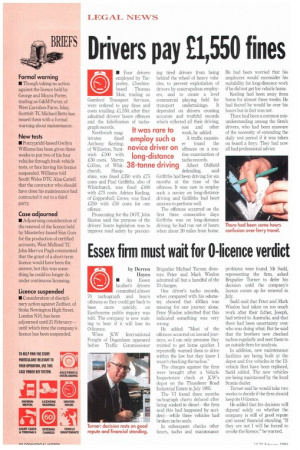Drivers pay £1,550 fines
Page 24

If you've noticed an error in this article please click here to report it so we can fix it.
II Four drivers employed by Tarporley, Cheshire. biased Thomas Moir, trading as Gamford Transport Services, were ordered to pay fines and costs totalling £1,550, after they admitted drivers' hours offences and the falsification of tachograph records.
Northwich mag istrates fined Anthony Keeling, of Willaston, Nantwich £100 with £50 costs. Martin Collins, of Whit
church. Shropshire, was fined £350 with 1:75 costs and Paul Griffiths, also of Whitchurch, was fined £400 with £75 costs. Adrian Keeling, of Coppenhall. Crewe. was fined £250 with £50 costs for one offence.
Prosecuting for the DOT, John Heaton said the purpose of the drivers' hours legislation was to improve road safety by prevent ing tired drivers from being behind the wheel of heavy vehicles, to prevent exploitation of drivers by unscrupulous employers, and to create a level commercial playing field for transport undertakings. It depended on drivers creating accurate and truthful records which reflected all their driving, rest and other work, he added.
A traffic examiner found the offences on a routine examination of tacho records.
Albert Oldfield defending, said Griffiths had been driving for six months at the time of the offences. It was rare to employ such a novice on long-distance driving and Griffiths had been anxious to perform well.
The offences occurred on the first three consecutive days Griffiths was on long-distance driving: he had run out of hours when about 20 miles from home. He had been worried that his employers would reconsider his suitability for long-distance work if he did not get his vehicle home.
Keeling had been away from home for almost three weeks. He had feared he would be over his hours but in fact was not.
There had been a common misunderstanding among the firm's drivers, who had been unaware of the necessity of extending the daily rest period if it was taken on board a ferry. They had now all had professional advice.




















































































































